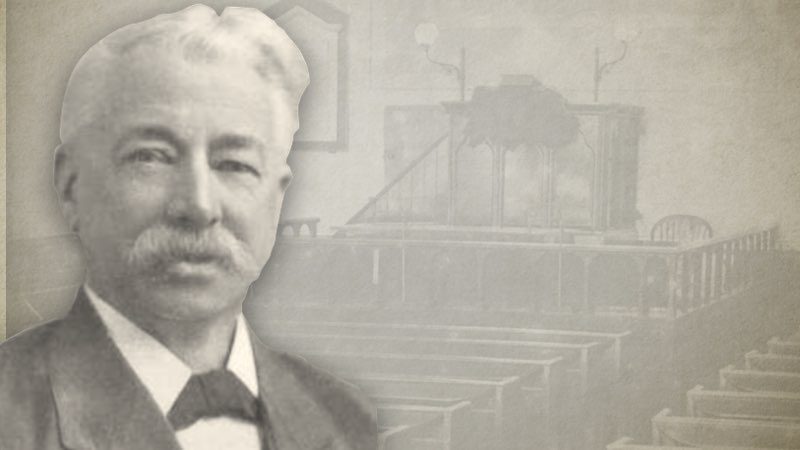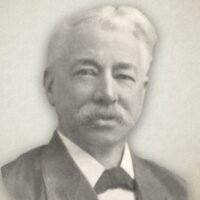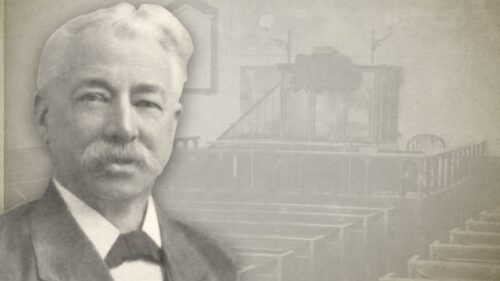
A Never-Failing Seed
Preached At Providence Chapel, Croydon, On November 26th, 1902
I will tell you one reason why I am taking this text to-night. Since I have been in this town, I have been reading the life of Mr. Covell. It is just twenty-three years ago to-day since your late pastor was translated from this life to the life above. Notwithstanding that God took away an able minister and removed your under-shepherd, there is still a seed here; “a seed shall serve Him.”
Peter says there are two things testified of by the prophets—the sufferings of Christ and the glory that should follow; both are contained in this Psalm. There is no one here who has understanding but will see that a greater than David is here. “My God, My God, why hast Thou forsaken Me?” Why did God forsake Him? There is comfort in this doctrine. If God had not forsaken His .Son, He must have forsaken us. God’s justice required that He should forsake His Son. “My God, My God, why hast Thou forsaken Me ‘—Me, Thy beloved Son in whom Thou art well pleased?” Why was it? Because He stood in the place of the Church. There Christ was a sacrifice, there He was a sin-bearer.
Here at the end of the Psalm we see “the glory that shall follow,” and it is a beautiful end to the Psalm. Because of what He accomplished on the cross, “a seed shall serve Him.” It is interesting to me to see how often Satan has tried to extinguish this seed that serve God. Every time it has been a failure. Just when all has appeared dark, the Lord has put forth His power and saved His people. I sometimes wonder what the thoughts of Satan were after the Fall. Even then God raised up an Abel who, we read, “offered unto God a more excellent sacrifice than Cain.” And I wonder what his thoughts were when God sent a deluge upon the earth. But even when this came to pass, an ark had been prepared to save Noah and his family. And when God burnt Up Sodom and Gomorrah, Lot was preserved. God always has had, and He always shall have, “a seed to serve Him.”
At the time of Christ’s crucifixion, how dark things looked! We might have thought, if we had stood by the cross of Calvary, when the Jews derided Him and His disciples forsook Him, and one denied Hun, we might have thought that God would soon have no seed; it would almost have seemed so to us. But even then a Gentile nation was to be raised up, that God might have a seed. Elijah thought he was almost the only true worshipper left, but when God spoke to him it was to tell him that there were seven thousand who had never bowed down to idols.
Sometimes we make mistakes. I think sometimes that the disciples made a mistake. They thought they must elect another in the place of Judas Iscariot. They chose Matthias; but I have never found (though I may be mistaken) that God used him. I do find, soon after, that God stopped a man who was on his way to Damascus, and made of him a great apostle. Whether it be with regard to numbers or to the qualification of a man, we are apt to be mistaken.
“A seed shall serve Him.” I often wonder if I am one of the seed. We sometimes read of “the seed of the Jews,” also of “the seed of Abraham according to the promise.” If we find in our heart a conflict, we have some evidence that we are of the right seed. God said that there should be conflict between the seed of the woman and the seed of the serpent. And we read that there was war between the house of David and the house of Saul. We take it as encouraging that it says, “The house of David waxed stronger and stronger, and the house of Saul waxed weaker and weaker.” So it is spiritually; the house of David—the house of Jesus—shall grow stronger and stronger. Your faith shall grow stronger and stronger; if the fruit of it is not seen, it may be taking deeper root. You are becoming more established in doctrine; you are growing stronger and stronger. “What will ye see in the Shulamite? As it were the company of two armies.” If you can prove that you have two natures—the flesh and the spirit—that spirit is an evidence that you have something of the true seed about you. Cain hated Abel, Saul hated David. Dagon and the ark can never stand together; neither can we reconcile grace and sin.
If we look upon this text as prophetical, we must go to the day of Pentecost. When Peter preached his remarkable sermon 3,000 people were pricked in the heart; a seed was called out of the Gentiles. “They shall come, and shall declare His righteousness unto a people that shall be born.” You know that when the Spirit descended upon the disciples they did go forth and declare His righteousness. “A seed shall serve Him; it shall be accounted to the Lord for a generation.” The seed went forth on that occasion, and were accounted for a generation. How do they serve Him? with what do they serve Him? Much is introduced now into worship as serving God that is not worship at all. “God is a Spirit, and they that worship Him must worship Him in spirit and in truth.”
In our large city (Bradford) much incense is offered in some of the so-called sanctuaries, and candles are kept burning in the day. All these things, I declare, according to the Scripture, are a stench in God’s nostrils. We read of God’s people who at one time lived in dens and caves of the earth. There was no incense there, except their prayers, which were offered to God by their Advocate. We are to serve God in the newness of the spirit, not in the oldness of the letter. We are not to go back to Jewish ritual; that would be an abomination to God. Christ is not only a Priest and a Sacrifice, but He is the Altar on which the sacrifice is to be offered. Whatever we offer must be laid on this altar, even a cup of cold water. All our talents, everything we offer God, we must offer through Christ.
“They shall came, and shall declare His righteousness.” I love to read the definite words of Scripture. Satan says they shall not come; their own hearts say they cannot come; their own relations may say they never will come; God says “they shall come,” they shall come from Egypt to Canaan. They may have mountains on each side, “they shall come.” They may have to go through a wilderness; “they shall come” from nature to grace. Formerly these people were “like the deaf adder, not listening to the voice of the charmer, charmed he never so wisely.” When God speaks they shall come. God opens their eyes and unstops their ears, they shall come. “Hearken, O daughter, and consider, and incline thine ear; forget also thine own people, and thy father’s house.” When I was reading a little while ago in Malachi 3:16, I felt what an expressive word “hearken” was. It is more than mere hearing; it seems as though every faculty is devoted to hearing. And this is how God hears the sighs of His people. So likewise when the Lord demands our attention we hearken. “Where the word of a King is, there is power.”
They shall come from the land of Assyria; they shall come from Moses to Christ, from earth to heaven. Have we any evidence, friends, that we have come? Have we been brought out of the world? Have we been brought out of the giddy multitude, brought out of our father’s house? Do you read the Bible differently to what you did?
“They shall come, and shall declare His righteousness.” Peter, on that Pentecostal day, preached to the people. What did he say? Before Peter had said to Christ, “Though all men deny Thee, yet will not I.”He had some strength then, but on that memorable day Peter “declared His righteousness.”
“They all declare, I nothing am.”
The Psalmist says, “When Thou with rebukes dost correct man for iniquity, Thou makest his beauty to consume away like a moth.” When God does this, a mart does not speak of his own righteousness; now he sees it all to be as filthy rags. (Rags are bad enough, but filthy rags are ten thousand times worse.) “All our righteousnesses” include that of the prophets and believers; it does not mean the righteousness of the Pharisees and Jews. Every action that Christ did, every particle of purity that He showed are all imputed to the believer. He went “to the end of the law for righteousness to every one that believeth.” Could He go further? Do we declare the same righteousness to-day? Most assuredly. We must be at one with God, we must be at one with Christ, we must be at one with the Bible, if we are rightly taught.
Notice this, that this declaration of Christ’s righteousness is sufficient. Now-a-days we hear of many half-filled chapels, and we hear of men introducing carnal, worldly things to keep the people together, as though anything but the declaration of Christ’s righteousness could regenerate souls. Nothing can but this; and not this alone, but by the power of the Holy Ghost. I have often been struck in reading the first chapter of Genesis—and now men try to shut God out of the Bible, and to shut Christ out of the Bible. I was glad to hear lately of a Unitarian minister. After, one Saturday, preparing his sermon as usual for the next day, when Sunday came he was missing, the pulpit was empty. In a few days they found him at Bradford. He said: “All the sermons I have prepared have been against the Divinity of Christ; now I find I cannot live without Him. I have denied the Divinity of Christ; I shall be lost without it.”—I rejoice in reading the first chapter of Genesis so often to see these words, “God saw; God spake; and God made.” So it is in salvation: Christ wrought; Christ did; Christ said.
“They shall come, and shall declare His righteousness unto a people that shall be born, that He hath done this.” We read in Psalm 40 that He hath done this: “He brought me up also out of an horrible pit, out of the miry clay, and set my feet upon a rock, and established my goings. And He hath put a new song in my mouth, even praise unto our God.” They shall all declare who are taught by His Spirit: “He taught me; He gave me hope; He hath done this.”
John Booth (1861-1928) was a Strict and Particular Baptist preacher. He was appointed the Pastor of Zoar Particular Baptist Chapel, Bradford, a position he served for thirty years. Walter Brooke wrote of him:
“With mingled feelings of pleasure and sorrow I accede to the request to write a short Foreword to the memoir of the life of my late beloved and esteemed friend. His removal is a great personal loss to me, having walked in loving friendship with him for about thirty years. Un- broken fellowship is a choice and rare privilege in these days when misunderstanding too often sadly mars our communion. In dear John Booth one possessed a friend to whom the heart could be opened freely. And if one was compelled to differ in judgment, which in this present imperfect state is well-nigh inevitable at times, there was no fear of communion being in any degree interrupted. His mind was large enough to admit that the freedom he claimed for himself should be accorded to others. Many interesting, entertaining and profitable hours did we spend together in friendly argument and discussion. Of him as a preacher one needs not to say much, as his praise is in the churches. But having had the privilege of hearing him on several occasions, perhaps a little personal testimony may be seasonable. His style was very clear and concise; his remarks very direct and pointed. This was the result of much prayerful thought and careful study. Our friend was no loiterer in the Lord's vineyard. Here is a specimen of his terse and suggestive mode of teaching: I was listening to my esteemed friend on a special occasion, and as he read his lesson, on reaching the words, " Thy kingdom come, Thy will be done," he paused, and in a most forceful manner remarked, Do you know what that means ? That means, Crucify me.” What a volume of meaning appeared to me in these few words! His simplicity of purpose, and the fearless expression of his deep convictions, were marked features of his preaching. There was no mistaking his meaning. John Booth believed and acted upon the words of his Lord and Master, " And call no man your father upon the earth, for One is your Father which is in heaven; neither be ye called masters, for One is your Master, even Christ." He sought his message from his Lord, and delivered it " not with enticing words of man's wisdom," but that "which the Holy Ghost teacheth, comparing spiritual things with spiritual." His labours were indeed abundant. His heart was in his loved work, and he always aimed to give his hearers of his very best. During my long, painful affliction his tender sympathy was marked, and he believed the time would come when I should again testify of the grace and love of the Lord Jesus. And it is my great comfort that he was spared to know that his convictions were true. In September of last year we met in Sussex, and I then heard him preach, from Rev. 19:6: "And I heard as it were the voice of a great multitude, and as the voice of many waters, and as the voice of mighty thunderings, saying, Alleluia: for the Lord God omnipotent reigneth." How we rejoiced together! On hearing of his lamented end, my heart was gladdened amid the sorrow in reflecting that his ransomed soul had joined the heavenly host in singing " Alleluia!” May those who have taken in hand the production of this volume be cheered and encouraged by a quick and extensive sale. And may we who are left for a while to labour on, remember the word of exhortation: "Whose faith follow, considering the end of their conversation, Jesus Christ, the same yesterday, and to-day, and forever."
John Booth Sermons




